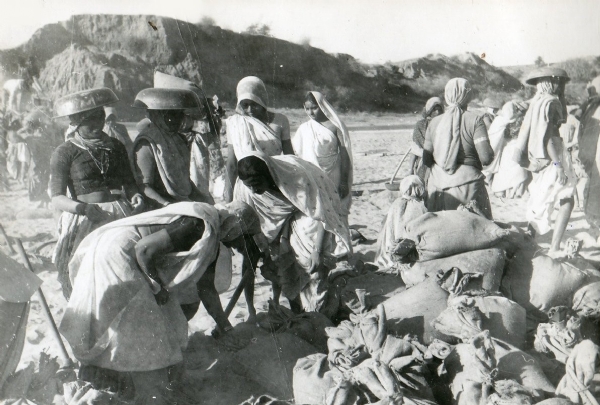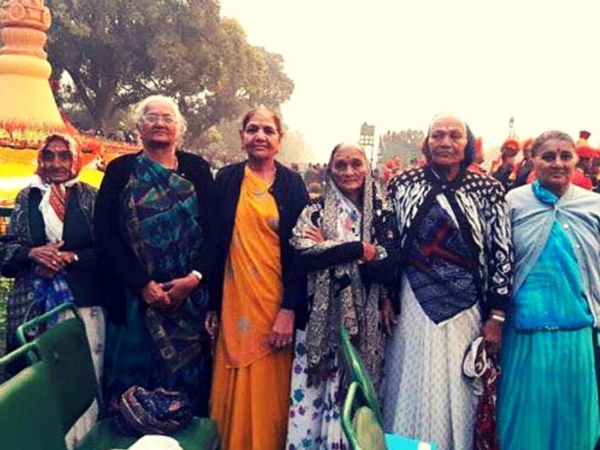1971 Indo-Pak war: How 300 Bhuj women risked their lives to rebuild a dysfunctional airstrip in 72 hours
300 villagers, most of whom were women, from Madhapur, Bhuj, decided to offer help to IAF and repaired the airstrip within 3 days
Total Views |
- Kinjal Yogesh Dixit
On the night of December 8, amidst the 1971 Indo-Pak War, a team of the Sabre jets had dropped over 14 Napalm bombs on the Indian Air Force airstrip situated in Bhuj. The impact of these bombs ultimately made this airstrip useless. Thus, the Indian combat aircraft could not take off.

Let us take a look at how some of these brave women recall the happenings of the time:
Valbhai Seghani was one of these women, who, when alerted about the bombings, before boarding the army vehicle, didn’t once think about their own safety or of her families, and travelled to the airstrip to repair it. They were 300 women who left their homes in order to extend help to the Air Force. These women were completely determined to ensure that those pilots will be able to fly from the airstrip again fly again from here.
The then District Collector had encouraged these courageous women to participate in this noble cause. But when the village sarpanch - Jadhavjibhai Hirani - personally asked the women to help the forces, the women willingly agreed. One more individual who played an important role in encouraging the women to come to help the army was the Squadron leader named Vijay Karnik.
He was in charge of the then Bhuj airport during the war. He, along with 2 senior officers, 50 IAF, 60 Defense Security Corps personnel, ensured that the airstrip would be operational despite the damage the bomb blast had caused it.

Restoring the bombed airstrip wasn’t an easy job - the lives of these civilian women were constantly at risk. A siren alerted them each time the IAF sensed any approaching Pakistani bombers.
The women would immediately run and hide into the bushes. They were all asked to wear pale green saris so as to camouflage ourselves with the trees. A short siren was an indication that the women could resume work. They worked hard through the day to make the optimum use of the daylight.
Valbai recalls that her son was not more than 18 months old when left him under the guardianship of her neighbours to do her bit for India. When the neighbours inquired as to who would take care of her son if something were to happen to her, she didn’t have an answer to give them.
On the night of December 8, amidst the 1971 Indo-Pak War, a team of the Sabre jets had dropped over 14 Napalm bombs on the Indian Air Force airstrip situated in Bhuj. The impact of these bombs ultimately made this airstrip useless. Thus, the Indian combat aircraft could not take off.

The IAF pled the Border Security Force (BSF) to restore the airstrip, but time was essentially running out, and the labourers weren’t many. It was at this time that 300 villagers – most of whom were women - from Madhapur, Bhuj, decided to offer help to IAF. Armed with nothing but a new level of patriotism, they took up the practically impossible task of repairing the airstrip. And they did, that too within only 72 hours!
Let us take a look at how some of these brave women recall the happenings of the time:
Valbhai Seghani was one of these women, who, when alerted about the bombings, before boarding the army vehicle, didn’t once think about their own safety or of her families, and travelled to the airstrip to repair it. They were 300 women who left their homes in order to extend help to the Air Force. These women were completely determined to ensure that those pilots will be able to fly from the airstrip again fly again from here.
The then District Collector had encouraged these courageous women to participate in this noble cause. But when the village sarpanch - Jadhavjibhai Hirani - personally asked the women to help the forces, the women willingly agreed. One more individual who played an important role in encouraging the women to come to help the army was the Squadron leader named Vijay Karnik.
He was in charge of the then Bhuj airport during the war. He, along with 2 senior officers, 50 IAF, 60 Defense Security Corps personnel, ensured that the airstrip would be operational despite the damage the bomb blast had caused it.

Squadron Leader Karnik recalled this incident saying that they were fighting a war, and if there had been any casualties of any of these women, it would have been a great loss to the war effort. But he took the decision and it worked out well. He briefed them where they can take shelter if there is an attack, and they followed the constructions bravely.
Restoring the bombed airstrip wasn’t an easy job - the lives of these civilian women were constantly at risk. A siren alerted them each time the IAF sensed any approaching Pakistani bombers.
The women would immediately run and hide into the bushes. They were all asked to wear pale green saris so as to camouflage ourselves with the trees. A short siren was an indication that the women could resume work. They worked hard through the day to make the optimum use of the daylight.
Also Read | 1971 War And Hamoodur Rehman Report
Viru Lachhani, another brave heart who repaired the airstrip recalls saying that they were instructed to cover the strip with cow dung to camouflage it from the enemy’s planes. While they were working, they had to scurry for shelter in bunkers at the sound of the siren. Taking shelter in bunkers during air strikes, they survived on sukhadi and chilli. On the first day, they had to sleep hungry, as there was nothing to eat. On the second day though, thanks to the kindness of a local temple, they women were offered fruits and sweets. It helped them work through the 3rd day. On the 4th day, at 4 pm, the combat aircraft took off from the airstrip. It was finally functional. It was indeed a very proud moment for them.
Valbai recalls that her son was not more than 18 months old when left him under the guardianship of her neighbours to do her bit for India. When the neighbours inquired as to who would take care of her son if something were to happen to her, she didn’t have an answer to give them.
Hiruben Bhudia, who had accompanied Valbai, had similar sentiments, the airstrip needed to be constructed at the earliest.. However, due to labour shortage, they counted on the women. In 72 hours, they ensured the pilots were flying again. These women must still share this same energy, and if the armed forces need them, they will work for them again, without a doubt.
3 years post-war, when the former Prime Minister Indira Gandhi offered these women presents, they turned her down humbly, saying that what they did was for their country. The Central government dedicated a war memorial called Virangana Smarak at Madhapar village of Bhuj to these brave hearts last year.